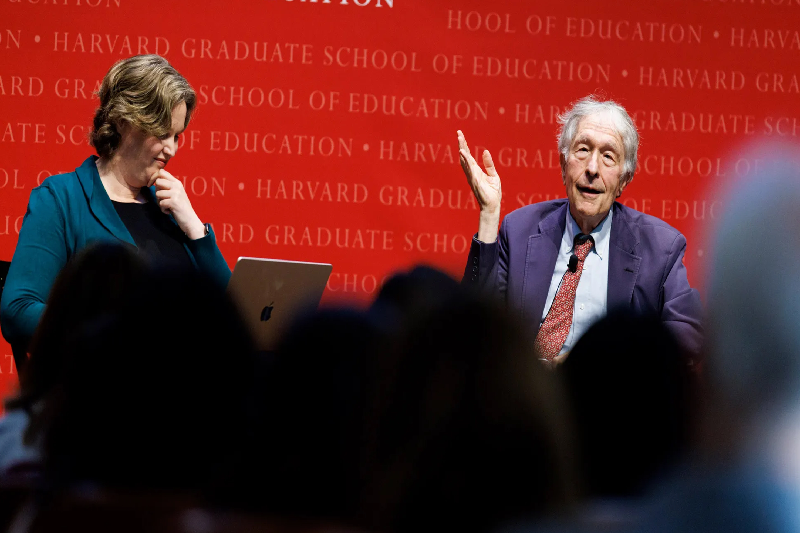
By 2050, Education Could Be Revolutionized by AI, Says Harvard Scholar
Education as we know it is poised for a radical transformation by the middle of this century. Traditional classrooms—with their fixed lessons, lengthy schooling periods, and rote memorization—could become relics of the past. Instead, students may find themselves collaborating closely with artificial intelligence (AI), guided by teachers who act more like mentors than traditional instructors. This new paradigm emphasizes human judgment, particularly in ethics and respect, as the irreplaceable skill set in an AI-augmented learning environment.
This vision was articulated recently at a forum held at the Harvard Graduate School of Education, where leading scholars highlighted how AI will fundamentally reshape the way knowledge is acquired and disseminated.
Education 2050: A Paradigm Shift in Learning
At the forum titled "Thinking in an AI-Augmented World," psychologist Howard Gardner and legal scholar Anthea Roberts offered compelling insights into the future of education shaped by AI. Howard Gardner, known worldwide for his theory of multiple intelligences, stressed that AI will cause a transformation unprecedented in the last millennium.
Gardner asserted that by 2050, children will only need brief instruction in core basics—“reading, ’riting, ’rithmetic, and a little bit of coding.” After this foundational training, the bulk of learning would shift dramatically.
He emphasized, “AI is as big a shift to schooling as the planet has experienced in 1,000 years,” signaling that many skills previously deemed essential will soon be outsourced to machines.
The Role of Teachers: From Professors to Mentors
Gardner’s vision includes a compressed schooling timeline, where after a brief period of learning fundamentals, the role of teachers transforms. Instead of traditional lectures, teachers will serve primarily as mentors, guiding students in a more personalized and dynamic learning environment.
Rather than spending 10 to 15 years in school, Gardner suggested, students will engage in diverse, challenge-driven activities that foster critical thinking, creativity, and preparation for productive work. This mentorship model aims to nurture students’ mindsets and help them find meaningful roles in a rapidly evolving world.
“I don't think going to school for 10 or 15 years as we've done it makes sense,” Gardner said, underlining the urgency for reform.
Students as Leaders of AI Teams
Legal scholar Anthea Roberts complemented Gardner’s perspective by imagining a future where students no longer execute every task themselves. Instead, they would lead teams of AI, essentially stepping into the role of directors, coaches, and editors.
Roberts illustrated this with examples: “You become the director of the actor, you become the coach of the athlete, and you become the editor of the writer.” In this future, AI acts as a powerful collaborator, amplifying human capability rather than replacing it.
She emphasized that AI’s role should expand human potential rather than diminish it, a crucial distinction to ensure meaningful educational development.
Shifting the Focus: Human Judgment in Ethics and Respect
Gardner revisited his classic works to reinforce the qualities that will remain uniquely human in an AI-dominated world. His theory of multiple intelligences, first introduced in Frames of Mind (1983), outlined seven modes of intelligence.
Later, in Five Minds for the Future (2005), he identified five critical modes of thinking that educators must nurture: disciplined, synthesising, creative, respectful, and ethical. Looking ahead, Gardner predicts machines will assume much of the disciplined, synthesising, and creative thinking. However, respect and ethics will remain the exclusive domain of human judgment—skills machines cannot replicate.
This emphasis on ethical reasoning and respect highlights the enduring need for human values even in an AI-enhanced educational landscape.
Challenges: Avoiding ‘Cognitive Offloading’
Both Gardner and Roberts raised concerns about ‘cognitive offloading’—the tendency to let AI do the thinking instead of the students themselves. This pitfall could undermine educational goals if learners become overly reliant on machines to perform mental tasks.
Roberts stressed the importance of using AI to expand human abilities rather than replace them. She noted her own experience working with multiple AI programs simultaneously, exchanging ideas in what she called a “conversation between the four of us.” This method illustrates how humans and AI can engage in collaborative knowledge-building rather than passive consumption.
“Our responsibility as people and as educators is to try to determine how we do that expansion rather than that replacement,” Roberts said, underscoring the challenge educators face in integrating AI effectively.
Preparing Educators and Policymakers for the AI Future
Martin West, the academic dean who organized the forum, emphasized the urgency of educators and policymakers understanding the evolving landscape.
“AI is already remodelling the future of education in ways that everybody working in the sector must come to grips with,” West stated. Preparing the education system to adapt to this technological revolution is vital for creating effective learning environments.
A Collaborative Classroom of the Future
The forum concluded without a single blueprint but with a shared conviction that classrooms in 2050 will be dynamic hubs of collaboration between humans and AI. Gone will be the rows of students memorizing facts. Instead, education will be an interactive, tailored experience where human mentors guide learners who actively engage with AI partners.
This vision promises not only more efficient knowledge acquisition but also an educational experience that cultivates uniquely human qualities of empathy, ethics, and respect—essential in an increasingly automated world.
Conclusion: Education’s AI-Enhanced Future
As we move toward 2050, the integration of artificial intelligence in education promises to revolutionize how students learn and how teachers teach. The shift from rigid schooling structures to mentorship-driven, AI-augmented learning environments could shorten traditional education timelines while enhancing skill development.
However, the enduring value of human judgment in ethics and respect will define the future classroom, ensuring that technology serves humanity, not the other way around.
The challenge for educators and policymakers is to harness AI responsibly, ensuring it complements and expands human potential rather than diminishing it.



